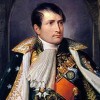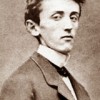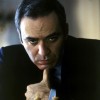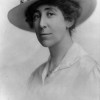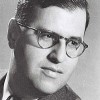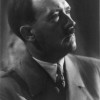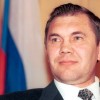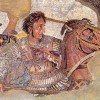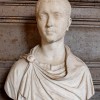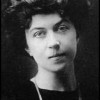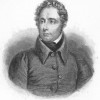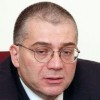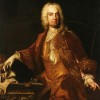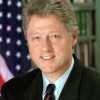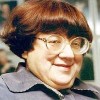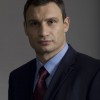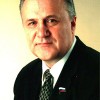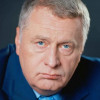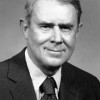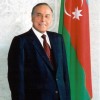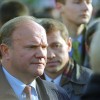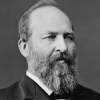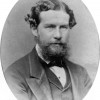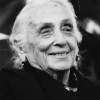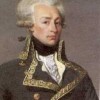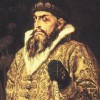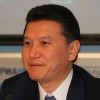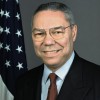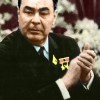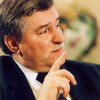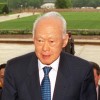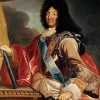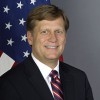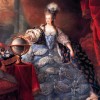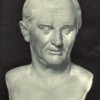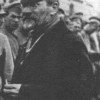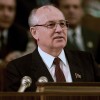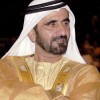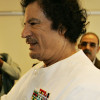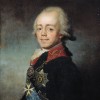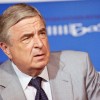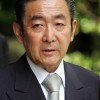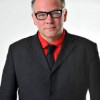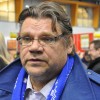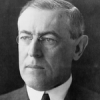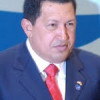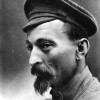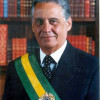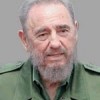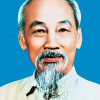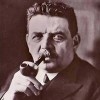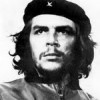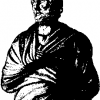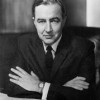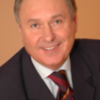Elizabeth I was Queen of England and Ireland from 17 November 1558 until her death on 24 March 1603. Sometimes called the Virgin Queen, Gloriana or Good Queen Bess, Elizabeth was the last of the five monarchs of the House of Tudor.
Garry Kimovich Kasparov is a Russian chess grandmaster, former World Chess Champion, writer, political activist and commentator.
From 1984 until his retirement in 2005, Kasparov was ranked world No. 1 for a record 255 months overall for his career. His peak rating of 2851, achieved in 1999, was the highest recorded until being surpassed by Magnus Carlsen in 2013. Kasparov also holds records for the most consecutive professional tournament victories (15) and Chess Oscars (11).
Kasparov became the youngest ever undisputed World Chess Champion in 1985 at age 22 by defeating then-champion Anatoly Karpov. He held the official FIDE world title until 1993 when a dispute with FIDE led him to set up a rival organization, the Professional Chess Association. In 1997 he became the first world champion to lose a match to a computer under standard time controls when he lost to the IBM supercomputer Deep Blue in a highly publicized match. He continued to hold the ""Classical"" World Chess Championship until his defeat by Vladimir Kramnik in 2000. Despite losing the title, he continued winning tournaments and was the world's highest-rated player when he retired from professional chess in 2005.
After retiring, he devoted his time to politics and writing. He formed the United Civil Front movement and joined as a member of The Other Russia, a coalition opposing the administration and policies of Vladimir Putin. In 2008, he announced an intention to run as a candidate in that year's Russian presidential race, but after encountering logistical problems in his campaign for which he blamed ""official obstruction"", he withdrew. In the wake of the Russian mass protests that began in 2011, he announced in 2013 that he had left Russia for the immediate future out of fear of persecution. Since 2014, he holds Croatian citizenship and owns a house in Makarska. Kasparov is currently chairman of the Human Rights Foundation and chairs its International Council. In 2017, he founded the Renew Democracy Initiative (RDI), an American political organization promoting and defending liberal democracy in the U. S. and abroad. He also serves as chairman of the group. Kasparov currently lives in New York City.
Джанет Пикеринг Рэнкин (англ.
Jeannette Pickering Rankin) — американский общественный деятель и политик, член Палаты представителей Конгресса США от штата Монтана. Первая женщина, избранная в Конгресс США — за 3 года до того, как американки получили право голосовать; единственный член Конгресса, который голосовал против вступления США как в Первую, так и во Вторую мировую войну.
Abraham Lincoln (February 12, 1809 – April 15, 1865) was an American statesman and lawyer who served as the 16th president of the United States from 1861 until his assassination in April 1865.
Lincoln led the nation through the American Civil War, its bloodiest war and its greatest moral, constitutional, and political crisis. He preserved the Union, abolished slavery, strengthened the federal government, and modernized the U.S. economy.
Adolf Hitler (German: [ˈadoːlf ˈhɪt.lɐ] (listen); 20 April 1889 – 30 April 1945) was an Austrian-born German politician who was dictator of Germany from 1933 until his death in 1945.
He rose to power as the leader of the Nazi Party, becoming the chancellor in 1933 and then taking the title of Führer und Reichskanzler in 1934. During his dictatorship, he initiated World War II in Europe by invading Poland on 1 September 1939. He was closely involved in military operations throughout the war and was central to the perpetration of the Holocaust, the genocide of about six million Jews and millions of other victims.
Hitler was born in Braunau am Inn in Austria-Hungary and was raised near Linz. He lived in Vienna later in the first decade of the 1900s and moved to Germany in 1913. He was decorated during his service in the German Army in World War I. In 1919, he joined the German Workers' Party (DAP), the precursor of the Nazi Party, and was appointed leader of the Nazi Party in 1921. In 1923, he attempted to seize governmental power in a failed coup in Munich and was imprisoned with a sentence of five years. In jail, he dictated the first volume of his autobiography and political manifesto Mein Kampf ("My Struggle"). After his early release in 1924, Hitler gained popular support by attacking the Treaty of Versailles and promoting pan-Germanism, anti-Semitism and anti-communism with charismatic oratory and Nazi propaganda. He frequently denounced international capitalism and communism as part of a Jewish conspiracy.
By November 1932, the Nazi Party held the most seats in the German Reichstag, but did not have a majority. As a result, no party was able to form a majority parliamentary coalition in support of a candidate for chancellor. The former chancellor Franz von Papen and other conservative leaders persuaded President Paul von Hindenburg to appoint Hitler as chancellor on 30 January 1933. Shortly after, the Reichstag passed the Enabling Act of 1933 which began the process of transforming the Weimar Republic into Nazi Germany, a one-party dictatorship based on the totalitarian and autocratic ideology of Nazism. On 2 August 1934, Hindenburg died and Hitler replaced him as the head of state and government. Hitler aimed to eliminate Jews from Germany and establish a New Order to counter what he saw as the injustice of the post-World War I international order dominated by Britain and France. His first six years in power resulted in rapid economic recovery from the Great Depression, the abrogation of restrictions imposed on Germany after World War I, and the annexation of territories inhabited by millions of ethnic Germans, which initially gave him significant popular support.
Hitler sought Lebensraum (lit. 'living space') for the German people in Eastern Europe, and his aggressive foreign policy is considered the primary cause of World War II in Europe. He directed large-scale rearmament and, on 1 September 1939, invaded Poland, resulting in Britain and France declaring war on Germany. In June 1941, Hitler ordered an invasion of the Soviet Union. In December 1941, he declared war on the United States. By the end of 1941, German forces and the European Axis powers occupied most of Europe and North Africa. These gains were gradually reversed after 1941, and in 1945 the Allied armies defeated the German army. On 29 April 1945, he married his longtime lover, Eva Braun, in the Führerbunker in Berlin. Less than two days later, the couple committed suicide to avoid capture by the Soviet Red Army. Their corpses were burned.
The historian and biographer Ian Kershaw describes Hitler as "the embodiment of modern political evil". Under Hitler's leadership and racially motivated ideology, the Nazi regime was responsible for the genocide of about six million Jews and millions of other victims, whom he and his followers deemed Untermenschen (subhumans) or socially undesirable. Hitler and the Nazi regime were also responsible for the killing of an estimated 19.3 million civilians and prisoners of war. In addition, 28.7 million soldiers and civilians died as a result of military action in the European theatre. The number of civilians killed during World War II was unprecedented in warfare, and the casualties constitute the deadliest conflict in history.
Barack Hussein Obama II ( (listen); born August 4, 1961) is an American attorney and politician who served as the 44th president of the United States from 2009 to 2017.
A member of the Democratic Party, he was the first African American to be elected to the presidency. He previously served as a U.S. senator from Illinois from 2005 to 2008 and an Illinois state senator from 1997 to 2004.
Obama was born in Honolulu, Hawaii. After graduating from Columbia University in 1983, he worked as a community organizer in Chicago. In 1988, he enrolled in Harvard Law School, where he was the first black president of the Harvard Law Review. After graduating, he became a civil rights attorney and an academic, teaching constitutional law at the University of Chicago Law School from 1992 to 2004. He represented the 13th district for three terms in the Illinois Senate from 1997 until 2004, when he ran for the U.S. Senate. He received national attention in 2004 with his March primary win, his well-received July Democratic National Convention keynote address, and his landslide November election to the Senate. In 2008, he was nominated for president a year after his campaign began, after a close primary campaign against Hillary Clinton. He was elected over Republican John McCain and was inaugurated on January 20, 2009. Nine months later, he was named the 2009 Nobel Peace Prize laureate.
Regarded as a centrist New Democrat, Obama signed many landmark bills into law during his first two years in office. The main reforms that were passed include the Patient Protection and Affordable Care Act (commonly referred to as the "Affordable Care Act" or "Obamacare"), the Dodd–Frank Wall Street Reform and Consumer Protection Act, and the Don't Ask, Don't Tell Repeal Act of 2010. The American Recovery and Reinvestment Act of 2009 and Tax Relief, Unemployment Insurance Reauthorization, and Job Creation Act of 2010 served as economic stimulus amidst the Great Recession. After a lengthy debate over the national debt limit, he signed the Budget Control and the American Taxpayer Relief Acts. In foreign policy, he increased U.S. troop levels in Afghanistan, reduced nuclear weapons with the United States–Russia New START treaty, and ended military involvement in the Iraq War. He ordered military involvement in Libya in opposition to Muammar Gaddafi, who was killed by NATO-assisted forces. He also ordered the military operations that resulted in the deaths of Osama bin Laden and suspected Yemeni Al-Qaeda operative Anwar al-Awlaki.
After winning re-election by defeating Republican opponent Mitt Romney, Obama was sworn in for a second term in 2013. During this term, he promoted inclusiveness for LGBT Americans. His administration filed briefs that urged the Supreme Court to strike down same-sex marriage bans as unconstitutional (United States v. Windsor and Obergefell v. Hodges); same-sex marriage was fully legalized in 2015 after the Court ruled that a same-sex marriage ban was unconstitutional in Obergefell. He advocated for gun control in response to the Sandy Hook Elementary School shooting, indicating support for a ban on assault weapons, and issued wide-ranging executive actions concerning global warming and immigration. In foreign policy, he ordered military intervention in Iraq in response to gains made by ISIL after the 2011 withdrawal from Iraq, continued the process of ending U.S. combat operations in Afghanistan in 2016, promoted discussions that led to the 2015 Paris Agreement on global climate change, initiated sanctions against Russia following the invasion in Ukraine and again after Russian interference in the 2016 United States elections, brokered a nuclear deal with Iran, and normalized U.S. relations with Cuba. Obama nominated three justices to the Supreme Court: Sonia Sotomayor and Elena Kagan were confirmed as justices, while Merrick Garland faced unprecedented partisan obstruction and was ultimately not confirmed. During his term in office, America's soft power and reputation abroad significantly improved.Obama's presidency has generally been regarded favorably, and evaluations of his presidency among historians, political scientists, and the general public place him among the upper tier of American presidents. Obama left office and retired in January 2017 and currently resides in Washington, D.C. A December 2018 Gallup poll found Obama to be the most admired man in America for an unprecedented 11th consecutive year, although Dwight D. Eisenhower was selected most admired in twelve non-consecutive years.
Barbara Pierce Bush (born Barbara Pierce; June 8, 1925 – April 17, 2018) was the first lady of the United States from 1989 to 1993 as the wife of George H. W. Bush, who served as the 41st president of the United States, and founder of the Barbara Bush Foundation for Family Literacy.
She previously was the second lady of the United States from 1981 to 1989. Among her six children are George W. Bush, the 43rd president of the United States, and Jeb Bush, the 43rd governor of Florida.
Barbara Pierce was born in New York City. She met George Herbert Walker Bush at the age of sixteen, and the two married in Rye, New York in 1945, while he was on leave during his deployment as a Naval officer in World War II. They moved to Texas in 1948, where George later began his political career.
Benjamin Franklin (January 17, 1706 [O.S. January 6, 1705] – April 17, 1790) was an American polymath and one of the Founding Fathers of the United States.
Franklin was a leading author, printer, political theorist, politician, Freemason, postmaster, scientist, inventor, humorist, civic activist, statesman, and diplomat. As a scientist, he was a major figure in the American Enlightenment and the history of physics for his discoveries and theories regarding electricity. As an inventor, he is known for the lightning rod, bifocals, and the Franklin stove, among other inventions. He founded many civic organizations, including the Library Company, Philadelphia's first fire department and the University of Pennsylvania.Franklin earned the title of "The First American" for his early and indefatigable campaigning for colonial unity, initially as an author and spokesman in London for several colonies. As the first United States Ambassador to France, he exemplified the emerging American nation. Franklin was foundational in defining the American ethos as a marriage of the practical values of thrift, hard work, education, community spirit, self-governing institutions, and opposition to authoritarianism both political and religious, with the scientific and tolerant values of the Enlightenment. In the words of historian Henry Steele Commager, "In a Franklin could be merged the virtues of Puritanism without its defects, the illumination of the Enlightenment without its heat." To Walter Isaacson, this makes Franklin "the most accomplished American of his age and the most influential in inventing the type of society America would become."Franklin became a successful newspaper editor and printer in Philadelphia, the leading city in the colonies, publishing the Pennsylvania Gazette at the age of 23. He became wealthy publishing this and Poor Richard's Almanack, which he authored under the pseudonym "Richard Saunders". After 1767, he was associated with the Pennsylvania Chronicle, a newspaper that was known for its revolutionary sentiments and criticisms of British policies.
He pioneered and was first president of Academy and College of Philadelphia which opened in 1751 and later became the University of Pennsylvania. He organized and was the first secretary of the American Philosophical Society and was elected president in 1769. Franklin became a national hero in America as an agent for several colonies when he spearheaded an effort in London to have the Parliament of Great Britain repeal the unpopular Stamp Act. An accomplished diplomat, he was widely admired among the French as American minister to Paris and was a major figure in the development of positive Franco-American relations. His efforts proved vital for the American Revolution in securing shipments of crucial munitions from France.
He was promoted to deputy postmaster-general for the British colonies in 1753, having been Philadelphia postmaster for many years, and this enabled him to set up the first national communications network. During the revolution, he became the first United States Postmaster General. He was active in community affairs and colonial and state politics, as well as national and international affairs. From 1785 to 1788, he served as governor of Pennsylvania. He initially owned and dealt in slaves but, by the late 1750s, he began arguing against slavery and became an abolitionist.
His colorful life and legacy of scientific and political achievement, and his status as one of America's most influential Founding Fathers, have seen Franklin honored more than two centuries after his death on coinage and the $100 bill, warships, and the names of many towns, counties, educational institutions, and corporations, as well as countless cultural references.
James Abram Garfield (November 19, 1831 – September 19, 1881) was the 20th president of the United States, serving from March 4, 1881 until his death by assassination six and a half months later.
He was the first sitting member of Congress to be elected to the presidency, and remains the only sitting House member to gain the White House.Garfield entered politics as a Republican in 1857. He served as a member of the Ohio State Senate from 1859 to 1861. Garfield opposed Confederate secession, served as a major general in the Union Army during the American Civil War, and fought in the battles of Middle Creek, Shiloh, and Chickamauga. He was first elected to Congress in 1862 to represent Ohio's 19th District. Throughout Garfield's extended congressional service after the Civil War, he firmly supported the gold standard and gained a reputation as a skilled orator. Garfield initially agreed with Radical Republican views regarding Reconstruction, but later favored a moderate approach for civil rights enforcement for freedmen.
At the 1880 Republican National Convention, delegates chose Garfield--who had not sought the White House--as a compromise presidential candidate on the 36th ballot. In the 1880 presidential election, Garfield conducted a low-key front porch campaign and narrowly defeated Democrat Winfield Scott Hancock. Garfield's accomplishments as president included a resurgence of presidential authority against senatorial courtesy in executive appointments, purging corruption in the Post Office, and appointing a U.S. Supreme Court justice. He enhanced the powers of the presidency when he defied the powerful New York senator Roscoe Conkling by appointing William H. Robertson to the lucrative post of Collector of the Port of New York, starting a fracas that ended with Robertson's confirmation and Conkling's resignation from the Senate. Garfield advocated agricultural technology, an educated electorate, and civil rights for African Americans. He also proposed substantial civil service reforms; those reforms were eventually passed by Congress in 1883 and signed into law by his successor, Chester A. Arthur, as the Pendleton Civil Service Reform Act.
On July 2, 1881, Garfield was shot at the Baltimore and Potomac Railroad Station in Washington D.C. by Charles J. Guiteau, a disappointed and delusional office seeker. The wound was not immediately fatal for Garfield, but he died on September 19, 1881 from infections caused by his doctors. Guiteau was executed for the murder of Garfield in June 1882.
John Adams (1735–1826) was the second president of the United States and first vice president.
John Adams may also refer to:
John Quincy Adams ( (listen); July 11, 1767 – February 23, 1848) was an American statesman, diplomat, lawyer, and diarist who served as the sixth president of the United States from 1825 to 1829.
He previously served as the eighth United States Secretary of State from 1817 to 1825. During his long diplomatic and political career, Adams also served as an ambassador, and represented Massachusetts as a United States Senator and as a member of the United States House of Representatives. He was the eldest son of John Adams, who served as the second US president from 1797 to 1801, and First Lady Abigail Adams. Initially a Federalist like his father, he won election to the presidency as a member of the Democratic-Republican Party, and in the mid-1830s became affiliated with the Whig Party.
Born in Braintree, Massachusetts, Adams spent much of his youth in Europe, where his father served as a diplomat. After returning to the United States, Adams established a successful legal practice in Boston. In 1794, President George Washington appointed Adams as the U.S. ambassador to the Netherlands, and Adams would serve in high-ranking diplomatic posts until 1801, when Thomas Jefferson took office as president. Federalist leaders in Massachusetts arranged for Adams's election to the United States Senate in 1802, but Adams broke with the Federalist Party over foreign policy and was denied re-election. In 1809, Adams was appointed as the U.S. ambassador to Russia by President James Madison, a member of the Democratic-Republican Party. Adams held diplomatic posts for the duration of Madison's presidency, and he served as part of the American delegation that negotiated an end to the War of 1812. In 1817, newly-elected President James Monroe selected Adams as his Secretary of State. In that role, Adams negotiated the Adams–Onís Treaty, which provided for the American acquisition of Florida. He also helped formulate the Monroe Doctrine, which became a key tenet of U.S. foreign policy.
The 1824 presidential election was contested by Adams, Andrew Jackson, William H. Crawford, and Henry Clay, all of whom were members of the Democratic-Republican Party. As no candidate won a majority of the electoral vote, the House of Representatives held a contingent election to determine the president, and Adams won that contingent election with the support of Clay. As president, Adams called for an ambitious agenda that included federally-funded infrastructure projects, the establishment of a national university, and engagement with the countries of Latin America, but many of his initiatives were defeated in Congress. During Adams's presidency, the Democratic-Republican Party polarized into two major camps: one group, known as the National Republican Party, supported President Adams, while the other group, known as the Democratic Party, was led by Andrew Jackson. The Democrats proved to be more effective political organizers than Adams and his National Republican supporters, and Jackson decisively defeated Adams in the 1828 presidential election.
Rather than retiring from public service, Adams won election to the House of Representatives, where he would serve from 1831 to his death in 1848. He joined the Anti-Masonic Party in the early 1830s before becoming a member of the Whig Party, which united those opposed to President Jackson. During his time in Congress, Adams became increasingly critical of slavery and of the Southern leaders whom he believed controlled the Democratic Party. He was particularly opposed to the annexation of Texas and the Mexican–American War, which he saw as a war to extend slavery. He also led the repeal of the "gag rule," which had prevented the House of Representatives from debating petitions to abolish slavery. Historians generally concur that Adams was one of the greatest diplomats and secretaries of state in American history, but they tend to rank him as an above-average president.
John Fitzgerald Kennedy (May 29, 1917 – November 22, 1963), often referred to by initials JFK and Jack, was an American politician who served as the 35th president of the United States from January 1961 until his assassination in November 1963.
Kennedy served at the height of the Cold War, and the majority of his work as president dealt with managing relations with the Soviet Union and Cuba. A Democrat, Kennedy represented Massachusetts in the U.S. House of Representatives and Senate prior to becoming president.
Kennedy was born in Brookline, Massachusetts, and graduated from Harvard University in 1940, before joining the U.S. Naval Reserve the following year. During World War II, he commanded a series of PT boats in the Pacific theater and earned the Navy and Marine Corps Medal for his service. After the war, Kennedy represented the 11th congressional district of Massachusetts in the U.S. House of Representatives from 1947 to 1953. He was subsequently elected to the U.S. Senate and served as the junior Senator from Massachusetts from 1953 to 1960. While in the Senate, Kennedy published his book Profiles in Courage, which won a Pulitzer Prize for Biography. In the 1960 presidential election, he narrowly defeated Republican opponent Richard Nixon, who was the incumbent vice president.
Kennedy's administration included high tensions with communist states in the Cold War. He increased the number of American military advisers in South Vietnam. In April 1961, he authorized a vain attempt to overthrow the Cuban government of Fidel Castro in the Bay of Pigs Invasion. Kennedy authorized the Cuban Project in November 1961. He rejected Operation Northwoods (plans for false flag attacks to gain approval for a war against Cuba) in March 1962, however his administration continued to plan for an invasion of Cuba in the summer of 1962. In October 1962, U.S. spy planes discovered Soviet missile bases had been deployed in Cuba; the resulting period of tensions, termed the Cuban Missile Crisis, nearly resulted in the breakout of a global thermonuclear conflict. Domestically, Kennedy presided over the establishment of the Peace Corps and the continuation of the Apollo space program, and supported the Civil Rights Movement, but was only somewhat successful in passing his New Frontier domestic policies.
On November 22, 1963, he was assassinated in Dallas, Texas. Vice President Lyndon B. Johnson assumed the presidency upon Kennedy's death. Marxist Lee Harvey Oswald was arrested for the state crime, but he was shot to death by Jack Ruby two days later. The FBI and the Warren Commission both concluded Oswald had acted alone in the assassination, but various groups contested the Warren Report and believed that Kennedy was the victim of a conspiracy. After Kennedy's death, Congress enacted many of his proposals, including the Civil Rights Act and the Revenue Act of 1964. Kennedy ranks highly in polls of U.S. presidents with historians and the general public. His personal life has also been the focus of considerable interest, following revelations of his chronic health ailments and extramarital affairs.
Isidora Dolores Ibárruri Gómez (9 December 1895 – 12 November 1989) – known as "La Pasionaria" (English: "the Passionflower") – was a Spanish Republican heroine of the Spanish Civil War of 1936-1939 and a communist politician of Basque origin, known for her famous slogan ¡No Pasarán! ("They shall not pass") issued during the Battle for Madrid in November 1936.
She joined the Spanish Communist Party (Spanish: Partido Comunista Español) when it was founded in 1920. In the 1930s she became a writer for the Communist Party of Spain (PCE) publication Mundo Obrero and in February 1936 was elected to the Cortes Generales as a PCE deputy for Asturias. Going into exile from Spain towards the end of the Civil War in 1939, she became General Secretary of the Central Committee of the Communist Party of Spain, a position she held from 1944 to 1960. The Party then named her honorary president of the PCE, a post she held for the rest of her life. Upon her return to Spain in 1977 she was re-elected as a deputy to the Cortes for the same region she had represented from 1936 to 1939 under the Spanish Second Republic.
Leslie Hore-Belisha, 1st Baron Hore-Belisha, was a British Liberal, then National Liberal Member of Parliament (MP) and Cabinet Minister.
Michael Anthony McFaul (born October 1, 1963) is an American academic and professor of political science who served as the United States Ambassador to Russia from 2012 to 2014.
Prior to his nomination to the ambassadorial position, McFaul worked for the U.S. National Security Council as Special Assistant to the President and senior director of Russian and Eurasian affairs. In that capacity he was the architect of U.S. President Barack Obama's Russian reset policy.
Malcolm Stevenson Forbes (August 19, 1919 – February 24, 1990) was an American entrepreneur most prominently known as the publisher of Forbes magazine, founded by his father B. C. Forbes.
He was known as an avid promoter of capitalism and free market trade, and for an extravagant lifestyle, spending on parties, travel, and his collection of homes, yachts, aircraft, art, motorcycles, and Fabergé eggs.
Margaret Hilda Thatcher, Baroness Thatcher, (née Roberts; 13 October 1925 – 8 April 2013) was a British stateswoman who served as Prime Minister of the United Kingdom from 1979 to 1990 and Leader of the Conservative Party from 1975 to 1990.
She was the longest-serving British prime minister of the 20th century and the first woman to hold that office. A Soviet journalist dubbed her "The 'Iron Lady'", a nickname that became associated with her uncompromising politics and leadership style. As Prime Minister, she implemented policies known as Thatcherism.
She studied chemistry at Somerville College, Oxford, and worked briefly as a research chemist, before becoming a barrister. Thatcher was elected Member of Parliament for Finchley in 1959. Edward Heath appointed her Secretary of State for Education and Science in his 1970–1974 government. In 1975, Thatcher defeated Heath in the Conservative Party leadership election to become Leader of the Opposition, the first woman to lead a major political party in the United Kingdom. She became Prime Minister after winning the 1979 general election.
Thatcher introduced a series of economic policies intended to reverse high unemployment and Britain's struggles in the wake of the Winter of Discontent and an ongoing recession. Her political philosophy and economic policies emphasised deregulation (particularly of the financial sector), flexible labour markets, the privatisation of state-owned companies, and reducing the power and influence of trade unions. Thatcher's popularity in her first years in office waned amid recession and rising unemployment, until victory in the 1982 Falklands War and the recovering economy brought a resurgence of support, resulting in her decisive re-election in 1983. She survived an assassination attempt in the Brighton hotel bombing in 1984.
Thatcher was re-elected for a third term in 1987, but her subsequent support for the Community Charge ("poll tax") was widely unpopular, and her views on the European Community were not shared by others in her Cabinet. She resigned as Prime Minister and party leader in November 1990, after Michael Heseltine launched a challenge to her leadership. After retiring from the Commons in 1992, she was given a life peerage as Baroness Thatcher (of Kesteven in the County of Lincolnshire) which entitled her to sit in the House of Lords. In 2013, she died of a stroke at the Ritz Hotel in London, at the age of 87.
Although a controversial figure in British politics, she is nonetheless viewed favourably in historical rankings of British prime ministers. Her tenure constituted a realignment towards neoliberal policies in the United Kingdom and debate over the complicated legacy of Thatcherism persists into the 21st century.
Marie Antoinette Josèphe Jeanne (; French: [maʁi ɑ̃twanɛt] (listen); née Maria Antonia Josepha Johanna; 2 November 1755 – 16 October 1793) was the last queen of France before the French Revolution.
She was born an archduchess of Austria, and was the penultimate child and youngest daughter of Empress Maria Theresa and Emperor Francis I. She became dauphine of France in May 1770 at age 14 upon her marriage to Louis-Auguste, heir apparent to the French throne. On 10 May 1774, her husband ascended the throne as Louis XVI and she became queen.
Marie Antoinette's position at court improved when, after eight years of marriage, she started having children. She became increasingly unpopular among the people, however, with the French libelles accusing her of being profligate, promiscuous, allegedly having illegitimate children, and harboring sympathies for France's perceived enemies—particularly her native Austria. The false accusations of the Affair of the Diamond Necklace damaged her reputation further. During the Revolution, she became known as Madame Déficit because the country's financial crisis was blamed on her lavish spending and her opposition to the social and financial reforms of Turgot and Necker.
Several events were linked to Marie Antoinette during the Revolution after the government had placed the royal family under house arrest in the Tuileries Palace in October 1789. The June 1791 attempted flight to Varennes and her role in the War of the First Coalition had disastrous effects on French popular opinion. On 10 August 1792, the attack on the Tuileries forced the royal family to take refuge at the Assembly, and they were imprisoned in the Temple Prison on 13 August. On 21 September 1792, the monarchy was abolished. Louis XVI was executed by guillotine on 21 January 1793. Marie Antoinette's trial began on 14 October 1793; she was convicted two days later by the Revolutionary Tribunal of high treason and executed, also by guillotine, at the Place de la Révolution.
Cato the Elder (Latin: Cato Major; 234–149 BC), born Marcus Porcius Cato and also known as Cato the Censor (Cato Censorius), Cato the Wise (Cato Sapiens), and Cato the Ancient (Cato Priscus), was a Roman soldier, senator and historian known for his conservatism and opposition to Hellenization.
He was the first to write history in Latin.
Marcus Tullius Cicero (Classical Latin: [ˈmaːr.kʊs ˈtʊl.lɪ.ʊs ˈkɪ.kɛ.roː]; 3 January 106 BC – 7 December 43 BC) was a Roman statesman, orator, lawyer and philosopher, who served as consul in the year 63 BC. He came from a wealthy municipal family of the Roman equestrian order, and is considered one of Rome's greatest orators and prose stylists.His influence on the Latin language was so immense that the subsequent history of prose, not only in Latin but in European languages up to the 19th century, was said to be either a reaction against or a return to his style.
Cicero introduced the Romans to the chief schools of Greek philosophy and created a Latin philosophical vocabulary (with neologisms such as evidentia, humanitas, qualitas, quantitas, and essentia) distinguishing himself as a translator and philosopher.
Though he was an accomplished orator and successful lawyer, Cicero believed his political career was his most important achievement. It was during his consulship that the second Catilinarian conspiracy attempted to overthrow the government through an attack on the city by outside forces, and Cicero suppressed the revolt by summarily and controversially executing five conspirators. During the chaotic latter half of the 1st century BC marked by civil wars and the dictatorship of Gaius Julius Caesar, Cicero championed a return to the traditional republican government. Following Julius Caesar's death, Cicero became an enemy of Mark Antony in the ensuing power struggle, attacking him in a series of speeches. He was proscribed as an enemy of the state by the Second Triumvirate and consequently executed by soldiers operating on their behalf in 43 BC after having been intercepted during an attempted flight from the Italian peninsula. His severed hands and head were then, as a final revenge of Mark Antony, displayed on The Rostra.
Petrarch's rediscovery of Cicero's letters is often credited for initiating the 14th-century Renaissance in public affairs, humanism, and classical Roman culture. According to Polish historian Tadeusz Zieliński, "the Renaissance was above all things a revival of Cicero, and only after him and through him of the rest of Classical antiquity." The peak of Cicero's authority and prestige came during the 18th-century Enlightenment, and his impact on leading Enlightenment thinkers and political theorists such as John Locke, David Hume, Montesquieu and Edmund Burke was substantial.
His works rank among the most influential in European culture, and today still constitute one of the most important bodies of primary material for the writing and revision of Roman history, especially the last days of the Roman Republic.
Mahmoud Ahmadinejad (Persian: محمود احمدینژاد, romanized: Mahmūd Ahmadīnežād [mæhmuːd(-e) æhmædiːneʒɒːd] (listen)), born Mahmoud Sabbaghian (Persian: محمود صباغیان, romanized: Mahmoud Sabbāghyān, 28 October 1956), is an Iranian conservative politician who served as the sixth president of Iran from 2005 to 2013.
He was known for his hardliner views and nuclearisation of Iran. He was also the main political leader of the Alliance of Builders of Islamic Iran, a coalition of conservative political groups in the country, and served as mayor of Tehran from 2003 to 2005, reversing many of his predecessor's reforms.
An engineer and teacher from a poor background, ideologically shaped by thinkers such as Navvab Safavi, Jalal Al-e-Ahmad and Ahmad Fardid, Ahmadinejad joined the Office for Strengthening Unity after the Iranian Revolution. Appointed a provincial governor in 1993, he was replaced along with all other provincial governors in 1997 after the election of President Mohammad Khatami and returned to teaching. Tehran's council elected him mayor in 2003. He took a religious hard line, reversing reforms of previous moderate mayors. His 2005 presidential campaign, supported by the Alliance of Builders of Islamic Iran, garnered 62% of the runoff election votes, and he became president on 3 August 2005.During his presidency, Ahmadinejad was a controversial figure in Iran and other countries. He has been criticized domestically for his economic policies and accused of disregard for human rights by organizations in North America and Europe. Outside of Iran, he has been criticized for his hostility towards countries including Israel, Saudi Arabia, the United Kingdom, and the United States and other Western and Arab states. In 2007, Ahmadinejad introduced a gasoline rationing plan to reduce the country's fuel consumption and cut the interest rates that private and public banking facilities could charge. He supports Iran's nuclear program. His election to a second term in 2009 was widely disputed and led to widespread protests domestically and criticism from Western countries.During his second term, Ahmadinejad experienced a power struggle with reformers and other traditionalists in parliament and the Revolutionary Guard and with Supreme Leader Ali Khamenei, over his dismissal of intelligence minister Gholam-Hossein Mohseni-Eje'i and his support for his controversial close adviser, Esfandiar Rahim Mashaei. On 14 March 2012, Ahmadinejad became the first president of the Islamic Republic of Iran to be summoned by the Islamic Consultative Assembly (parliament) to answer questions regarding his presidency. Limited to two terms under the current Iranian constitution, Ahmadinejad supported Mashaei's campaign for president. On 15 June 2013, Hassan Rouhani was elected as Ahmadinejad's successor and assumed office on 3 August 2013.
On 12 April 2017, Ahmadinejad announced that he intended to run for a third term in the 2017 presidential election, against the objections of Supreme Leader Ayatollah Khamenei. His nomination was rejected by the Guardian Council. During the 2017–18 Iranian protests, Ahmadinejad criticized the current government of Iran. He made a second attempt at registering to run for the 2021 presidential election, and was rejected again by the Guardian Council.
Kemal Atatürk (until 1934: Mustafa Kemal Pasha, Ottoman Turkish: مصطفى كمال پاشا; after 1935: Kamâl Atatürk; 19 May 1881 (conventional) – 10 November 1938), commonly referred to as Mustafa Kemal Atatürk ( (listen); Turkish: [mustaˈfa ceˈmal aˈtatyɾc]), was a Turkish field marshal (Mareşal), revolutionary statesman, author, and founder of the Republic of Turkey, serving as its first President from 1923 until his death in 1938.
His leadership undertook sweeping liberal reforms, which modernized Turkey into a secular, industrial nation. Ideologically a secularist and nationalist, his policies and theories became known as Kemalism.
Atatürk came to prominence for his role in securing the Ottoman Turkish victory at the Battle of Gallipoli (1915) during World War I. Following the defeat and dissolution of the Ottoman Empire, he led the Turkish National Movement, which resisted the mainland Turkey's partition among the victorious Allied powers. Establishing a provisional government in the present-day Turkish capital Ankara, he defeated the forces sent by the Allies, thus emerging victorious from what was later referred to as the Turkish War of Independence. He subsequently proceeded to abolish the decrepit Ottoman Empire and proclaimed the foundation of the Turkish Republic in its place.
As the president of the newly formed Turkish Republic, Atatürk initiated a rigorous program of political, economic, and cultural reforms with the ultimate aim of building a modern, progressive, and secular nation-state. He made primary education free and compulsory, opening thousands of new schools all over the country. He also introduced the Latin-based Turkish alphabet, replacing the old Ottoman Turkish alphabet. Turkish women received equal civil and political rights during Atatürk's presidency ahead of many Western countries. In particular, women were given voting rights in local elections by Act no. 1580 on 3 April 1930 and a few years later, in 1934, full universal suffrage, earlier than most other countries in the world.His government carried out a policy of Turkicisation trying to create a homogeneous and unified nation. Under Atatürk, non-Turkish minorities were pressured to speak Turkish in public, non-Turkish toponyms and last names of minorities had to be changed to Turkish renditions. The Turkish Parliament granted him the surname Atatürk in 1934, which means "Father of the Turks", in recognition of the role he played in building the modern Turkish Republic. He died on 10 November 1938 at the age of 57 in Dolmabahçe Palace; he was succeeded as President by his long-time Prime Minister İsmet İnönü and was honored with a state funeral. His iconic mausoleum, built and opened in 1953, is surrounded by a park called the Peace Park in honor of his famous expression "Peace at Home, Peace in the World".
In 1981, the centennial of Atatürk's birth, his memory was honoured by the UN and UNESCO, which declared it The Atatürk Year in the World and adopted the Resolution on the Atatürk Centennial, describing him as "the leader of the first struggle given against colonialism and imperialism" and a "remarkable promoter of the sense of understanding between peoples and durable peace between the nations of the world and that he worked all his life for the development of harmony and cooperation between peoples without distinction". Atatürk is commemorated by many memorials throughout Turkey and numerous countries all over the world, where place names are named in honor of him. Eleftherios Venizelos, former Prime Minister of Greece, forwarded Atatürk's name for the 1934 Nobel Peace Prize.
Nelson Rolihlahla Mandela was a South African anti-apartheid revolutionary, political leader and philanthropist who served as President of South Africa from 1994 to 1999.
He was the country's first black head of state and the first elected in a fully representative democratic election. His government focused on dismantling the legacy of apartheid by tackling institutionalised racism and fostering racial reconciliation. Ideologically an African nationalist and socialist, he served as the president of the African National Congress (ANC) party from 1991 to 1997.
Ronald Wilson Reagan (February 6, 1911 – June 5, 2004) was an American politician who served as the 40th president of the United States from 1981 to 1989 and became the highly influential voice of modern conservatism.
Prior to his presidency, he was a Hollywood actor and union leader before serving as the 33rd governor of California from 1967 to 1975.
Reagan was raised in a poor family in small towns of northern Illinois. He graduated from Eureka College in 1932 and worked as a sports commentator on several regional radio stations. After moving to California in 1937, he found work as an actor and starred in a few major productions. Reagan was twice elected President of the Screen Actors Guild—the labor union for actors—where he worked to root out Communist influence. In the 1950s, he moved into television and was a motivational speaker at General Electric factories, during which time he became a conservative. Reagan was a Democrat until 1962, when he switched to the Republican Party. In 1964, Reagan's speech, "A Time for Choosing", supported Barry Goldwater's foundering presidential campaign and earned him national attention as a new conservative spokesman.
Building a network of supporters, Reagan was elected governor of California in 1966. As governor, Reagan raised taxes, turned a state budget deficit to a surplus, challenged the protesters at the University of California, ordered in National Guard troops during a period of protest movements in 1969, and was re-elected in 1970. He twice ran unsuccessfully for the Republican presidential nomination, in 1968 and 1976. Four years later in 1980, he won the nomination and then defeated incumbent president Jimmy Carter. At 69 years, 349 days of age at the time of his first inauguration, Reagan was the oldest person to have been elected to a first term, until Donald Trump (aged 70 years, 220 days) in 2017. Reagan is still, however, the oldest president elected, at 73 years, 349 days of age at his second inauguration. Reagan faced former vice president Walter Mondale when he ran for re-election in 1984, and defeated him, winning the most electoral votes of any U.S. president, 525, or 97.6% of the 538 votes in the Electoral College. This was the second-most lopsided presidential election in modern U.S. history after Franklin D. Roosevelt's 1936 victory over Alfred M. Landon, in which he won 98.5% or 523 of the (then-total) 531 electoral votes.Soon after taking office as president, Reagan began implementing sweeping new political and economic initiatives. His supply-side economic policies, dubbed "Reaganomics", advocated tax rate reduction to spur economic growth, economic deregulation, and reduction in government spending. In his first term he survived an assassination attempt, spurred the War on Drugs, and fought public sector labor. Over his two terms, the economy saw a reduction of inflation from 12.5% to 4.4%, and an average annual growth of real GDP of 3.4%. Reagan enacted cuts in domestic discretionary spending, cut taxes, and increased military spending which contributed to increased federal outlays overall, even after adjustment for inflation. Foreign affairs dominated his second term, including ending the Cold War, the bombing of Libya, the Iran–Iraq War, and the Iran–Contra affair. In June 1987, four years after he publicly described the Soviet Union as an "evil empire", Reagan challenged Soviet General Secretary Mikhail Gorbachev to "tear down this wall!", during a speech at the Brandenburg Gate. He transitioned Cold War policy from détente to rollback by escalating an arms race with the USSR while engaging in talks with Gorbachev. The talks culminated in the INF Treaty, which shrank both countries' nuclear arsenals. Reagan began his presidency during the decline of the Soviet Union, and the Berlin Wall fell just ten months after the end of his term. Germany reunified the following year, and on December 26, 1991 (nearly three years after he left office), the Soviet Union collapsed.
When Reagan left office in 1989, he held an approval rating of 68%, matching those of Franklin D. Roosevelt, and later Bill Clinton, as the highest ratings for departing presidents in the modern era. He was the first president since Dwight D. Eisenhower to serve two full terms, after a succession of five prior presidents did not. Although he had planned an active post-presidency, Reagan disclosed in November 1994 that he had been diagnosed with Alzheimer's disease earlier that year. Afterward, his informal public appearances became more infrequent as the disease progressed. He died at home on June 5, 2004. His tenure constituted a realignment toward conservative policies in the United States, and he is an icon among conservatives. Evaluations of his presidency among historians and the general public place him among the upper tier of American presidents.
Theodore Roosevelt Jr. ( ROH-zə-velt; October 27, 1858 – January 6, 1919) was an American statesman, politician, conservationist, naturalist, and writer who served as the 26th president of the United States from 1901 to 1909.
He served as the 25th vice president from March to September 1901 and as the 33rd governor of New York from 1899 to 1900. As a leader of the Republican Party, he became a driving force for the Progressive Era in the United States in the early 20th century. His face is depicted on Mount Rushmore alongside George Washington, Thomas Jefferson, and Abraham Lincoln. He is generally ranked in polls of historians and political scientists as one of the five best presidents.Roosevelt was born a sickly child with debilitating asthma, but he overcame his health problems by embracing a strenuous lifestyle. He integrated his exuberant personality, vast range of interests, and world-famous achievements into a "cowboy" persona defined by robust masculinity. He was home-schooled, and he began a lifelong naturalist avocation before attending Harvard College. His book The Naval War of 1812 (1882) established his reputation as a learned historian and as a popular writer. Upon entering politics, he became the leader of the reform faction of Republicans in New York's state legislature. His wife and his mother both died in rapid succession, and he escaped to a cattle ranch in the Dakotas. He served as Assistant Secretary of the Navy under President William McKinley, but he resigned from that post to lead the Rough Riders during the Spanish–American War, returning a war hero. He was elected Governor of New York in 1898. Vice President Garret Hobart died, and the New York state party leadership convinced McKinley to accept Roosevelt as his running mate in the 1900 election. Roosevelt campaigned vigorously, and the McKinley-Roosevelt ticket won a landslide victory based on a platform of peace, prosperity, and conservation.
Roosevelt took office as vice president in March 1901 and assumed the presidency at age 42 following McKinley's assassination the following September. He remains the youngest person to become President of the United States. Roosevelt was a leader of the Progressive movement, and he championed his "Square Deal" domestic policies, promising the average citizen fairness, breaking of trusts, regulation of railroads, and pure food and drugs. He made conservation a top priority and established many new national parks, forests, and monuments intended to preserve the nation's natural resources. In foreign policy, he focused on Central America where he began construction of the Panama Canal. He expanded the Navy and sent the Great White Fleet on a world tour to project the United States' naval power around the globe. His successful efforts to broker the end of the Russo-Japanese War won him the 1906 Nobel Peace Prize. He avoided controversial tariff and money issues. He was elected to a full term in 1904 and continued to promote progressive policies, many of which were passed in Congress. He groomed his close friend William Howard Taft, and Taft won the 1908 presidential election to succeed him.
Roosevelt grew frustrated with Taft's conservatism and belatedly tried to win the 1912 Republican nomination. He failed, walked out, and founded the so-called "Bull Moose" Party which called for wide-ranging progressive reforms. He ran in the 1912 election and the split allowed the Democratic nominee Woodrow Wilson to win the election. Following the defeat, Roosevelt led a two-year expedition to the Amazon basin where he nearly died of tropical disease. During World War I, he criticized President Wilson for keeping the country out of the war with Germany, and his offer to lead volunteers to France was rejected. He considered running for president again in 1920, but his health continued to deteriorate and he died in 1919.
Thomas Jefferson (April 13, 1743 – July 4, 1826) was an American statesman, diplomat, lawyer, architect, and Founding Father who served as the third president of the United States from 1801 to 1809.
Previously, he had served as the second vice president of the United States from 1797 to 1801. The principal author of the Declaration of Independence, Jefferson was a proponent of democracy, republicanism, and individual rights, motivating American colonists to break from the Kingdom of Great Britain and form a new nation; he produced formative documents and decisions at both the state and national level.
During the American Revolution, he represented Virginia in the Continental Congress that adopted the Declaration, drafted the law for religious freedom as a Virginia legislator, and served as the second Governor of Virginia from 1779 to 1781, during the American Revolutionary War. He became the United States Minister to France in May 1785, and subsequently the nation's first secretary of state under President George Washington from 1790 to 1793. Jefferson and James Madison organized the Democratic-Republican Party to oppose the Federalist Party during the formation of the First Party System. With Madison, he anonymously wrote the controversial Kentucky and Virginia Resolutions in 1798 and 1799, which sought to strengthen states' rights by nullifying the federal Alien and Sedition Acts.
As president, Jefferson pursued the nation's shipping and trade interests against Barbary pirates and aggressive British trade policies. He also organized the Louisiana Purchase, almost doubling the country's territory. As a result of peace negotiations with France, his administration reduced military forces. He was reelected in 1804. Jefferson's second term was beset with difficulties at home, including the trial of former vice president Aaron Burr. American foreign trade was diminished when Jefferson implemented the Embargo Act of 1807, responding to British threats to U.S. shipping. In 1803, Jefferson began a controversial process of Indian tribe removal to the newly organized Louisiana Territory, and he signed the Act Prohibiting Importation of Slaves in 1807. After retiring from public office, Jefferson founded the University of Virginia.
Jefferson, while primarily a planter, lawyer and politician, mastered many disciplines, which ranged from surveying and mathematics to horticulture and mechanics. He was an architect in the classical tradition. Jefferson's keen interest in religion and philosophy led to his presidency of the American Philosophical Society; he shunned organized religion but was influenced by both Christianity and deism. A philologist, Jefferson knew several languages. He was a prolific letter writer and corresponded with many prominent people. His only full-length book is Notes on the State of Virginia (1785), considered perhaps the most important American book published before 1800.Although regarded as a leading spokesman for democracy and republicanism in the era of the Enlightenment, some modern scholarship has been critical of Jefferson's private life, finding a contradiction between his ownership of the large numbers of slaves that worked his plantations and his famous declaration that "all men are created equal". Although the matter remains a subject of debate, most historians believe that Jefferson had a sexual relationship with his slave Sally Hemings, a mixed-race woman who was a half-sister to his late wife, and that he fathered at least one of her children. Presidential scholars and historians generally praise Jefferson's public achievements, including his advocacy of religious freedom and tolerance in Virginia. Jefferson continues to rank highly among U.S. presidents.
Hugo Rafael Chávez Frías (, Spanish pronunciation: [ˈuɣo rafaˈel ˈtʃaβes ˈfɾi.as] (listen); 28 July 1954 – 5 March 2013) was a Venezuelan politician who was president of Venezuela from 1999 until his death in 2013.
Chávez was also leader of the Fifth Republic Movement political party from its foundation in 1997 until 2007, when it merged with several other parties to form the United Socialist Party of Venezuela (PSUV), which he led until 2012.
Born into a middle class family in Sabaneta, Barinas, Chávez became a career military officer and, after becoming dissatisfied with the Venezuelan political system based on the Puntofijo Pact, founded the clandestine Revolutionary Bolivarian Movement-200 (MBR-200) in the early 1980s. Chávez led the MBR-200 in an unsuccessful coup d'état against the Democratic Action government of President Carlos Andrés Pérez in 1992, for which he was imprisoned. Pardoned from prison after two years, he founded a political party known as the Fifth Republic Movement and was elected president of Venezuela in 1998. He was re-elected in 2000 and again in 2006 with over 60% of the votes. After winning his fourth term as president in the October 2012 presidential election, he was to be sworn in on 10 January 2013. However, the inauguration was postponed due to his cancer treatment, and he died in Caracas on 5 March 2013 at the age of 58.Following the adoption of a new constitution in 1999, Chávez focused on enacting social reforms as part of the Bolivarian Revolution. Using record-high oil revenues of the 2000s, his government nationalized key industries, created participatory democratic Communal Councils and implemented social programs known as the Bolivarian missions to expand access to food, housing, healthcare and education. The high oil profits coinciding with the start of Chavez' presidency resulted in temporary improvements in areas such as poverty, literacy, income equality and quality of life between primarily 2003 and 2007, with a reversal beginning after around 2012; beyond falling oil prices, there are arguments that government policies did not address structural inequalities. On 2 June 2010, Chávez declared an "economic war" on Venezuela's upper classes due to shortages, arguably beginning the crisis in Venezuela. By the end of Chávez's presidency in the early 2010s, economic actions performed by his government during the preceding decade, such as deficit spending and price controls, proved to be unsustainable, with Venezuela's economy faltering. At the same time, poverty, inflation and shortages increased.
Under Chavez, Venezuela experienced democratic backsliding, as he suppressed the press, manipulated electoral laws, and arrested and exiled government critics. His use of enabling acts and his government's use of propaganda were controversial. Chávez's presidency saw significant increases in the country's murder rate and continued corruption within the police force and government.Internationally, Chávez aligned himself with the Marxist–Leninist governments of Fidel and then Raúl Castro in Cuba, as well as the socialist governments of Evo Morales (Bolivia), Rafael Correa (Ecuador) and Daniel Ortega (Nicaragua). His presidency was seen as a part of the socialist "pink tide" sweeping Latin America. Chávez described his policies as anti-imperialist, being a prominent adversary of the United States's foreign policy as well as a vocal critic of U.S.-supported neoliberalism and laissez-faire capitalism. He described himself as a Marxist. He supported Latin American and Caribbean cooperation and was instrumental in setting up the pan-regional Union of South American Nations, the Community of Latin American and Caribbean States, the Bolivarian Alliance for the Americas, the Bank of the South and the regional television network TeleSUR. Chavez's ideas, programs, and style form the basis of "Chavismo", a political ideology closely associated with Bolivarianism and socialism of the 21st century.
William Pitt the Younger (28 May 1759 – 23 January 1806) was a prominent British Tory statesman of the late-eighteenth and early-nineteenth centuries.
He became the youngest Prime Minister of Great Britain in 1783 at the age of 24 and the first UK Prime Minister in January 1801. He left office in March 1801, but served as Prime Minister again from 1804 until his death in 1806. He was Chancellor of the Exchequer for all of his time as Prime Minister.
Pitt's prime ministerial tenure, which came during the reign of George III, was dominated by major events in Europe, including the French Revolution and the Napoleonic Wars. He is known as "the Younger" to distinguish him from his father, William Pitt, 1st Earl of Chatham, called William Pitt the Elder or simply "Chatham", who had previously served as Prime Minister.
Pitt, although often referred to as a Tory, or "new Tory", called himself an "independent Whig" and was generally opposed to the development of a strict partisan political system. He led Britain in the great wars against France and Napoleon.
Pitt was an outstanding administrator who worked for efficiency and reform, bringing in a new generation of outstanding administrators. He increased taxes to pay for the great war against France and cracked down on radicalism. To engage the threat of Irish support for France, he engineered the Acts of Union 1800 and tried (but failed) to get Catholic emancipation as part of the Union. He created the "new Toryism", which revived the Tory Party and enabled it to stay in power for the next quarter-century.
The historian Asa Briggs argues that his personality did not endear itself to the British mind, for Pitt was too solitary and too colourless, and too often exuded superiority. His greatness came in the war with France. Pitt reacted to become what Lord Minto called "the Atlas of our reeling globe". His integrity and industry and his role as defender of the threatened nation allowed him to inspire and access all the national reserves of strength. William Wilberforce said that, "For personal purity, disinterestedness and love of this country, I have never known his equal." Historian Charles Petrie concludes that he was one of the greatest prime ministers "if on no other ground than that he enabled the country to pass from the old order to the new without any violent upheaval ... He understood the new Britain." For this he is ranked highly amongst British Prime Ministers.
Sir Winston Leonard Spencer-Churchill (30 November 1874 – 24 January 1965) was a British politician, army officer, and writer.
He was Prime Minister of the United Kingdom from 1940 to 1945, when he led Britain to victory in the Second World War, and again from 1951 to 1955. Churchill represented five constituencies during his career as a Member of Parliament (MP). Ideologically an economic liberal and imperialist, for the last of his career he was a member of the Conservative Party, which he led from 1940 to 1955, but from 1904 to 1924 was a member of the Liberal Party.
Of mixed English and American parentage, Churchill was born in Oxfordshire to a wealthy, aristocratic family. Joining the British Army, he saw action in British India, the Anglo–Sudan War, and the Second Boer War, gaining fame as a war correspondent and writing books about his campaigns. Elected an MP in 1900, initially as a Conservative, he defected to the Liberals in 1904. In H. H. Asquith's Liberal government, Churchill served as President of the Board of Trade, Home Secretary, and First Lord of the Admiralty, championing prison reform and workers' social security. During the First World War, he oversaw the Gallipoli Campaign; after it proved a disaster, he resigned from government and served in the Royal Scots Fusiliers on the Western Front. In 1917, he returned to government under David Lloyd George as Minister of Munitions, then as Secretary of State for War and Air, and finally for the Colonies, overseeing the Anglo-Irish Treaty and Britain's Middle East policy. After two years out of Parliament, he served as Chancellor of the Exchequer in Stanley Baldwin's Conservative government, returning the pound sterling in 1925 to the gold standard at its pre-war parity, a move widely seen as creating deflationary pressure on the UK economy.
Out of office during the 1930s, Churchill took the lead in calling for British rearmament to counter the growing threat from Nazi Germany. At the outbreak of the Second World War he was re-appointed First Lord of the Admiralty. In 1940 he became prime minister, replacing Neville Chamberlain. Churchill oversaw British involvement in the Allied war effort against Germany and the Axis powers, resulting in victory in 1945. His wartime leadership was widely praised, although acts like the Bombing of Dresden and his wartime response to the Bengal famine generated controversy. After the Conservatives' defeat in the 1945 general election, he became Leader of the Opposition. Amid the developing Cold War with the Soviet Union, he publicly warned of an "iron curtain" of Soviet influence in Europe and promoted European unity. Re-elected Prime Minister in 1951, his second term was preoccupied with foreign affairs, including the Malayan Emergency, Mau Mau Uprising, Korean War, and a UK-backed Iranian coup. Domestically his government emphasised house-building and developed a nuclear weapon. In declining health, Churchill resigned as prime minister in 1955, although he remained an MP until 1964. Upon his death in 1965, he was given a state funeral.
Widely considered one of the 20th century's most significant figures, Churchill remains popular in the UK and Western world, where he is seen as a victorious wartime leader who played an important role in defending Europe's liberal democracy from the spread of fascism. Also praised as a social reformer and writer, among his many awards was the Nobel Prize in Literature. Conversely, his imperialist views and comments on race, as well as his sanctioning of human rights abuses in the suppression of anti-imperialist movements seeking independence from the British Empire, have generated considerable controversy.
Ferdinand I or Fernando I may refer to:
Ferdinand I of León, the Great (ca. 1000–1065, king from 1037)
Ferdinand I of Portugal and the Algarve, the Handsome (1345–1383, king from 1367)
Ferdinand I of Aragon and Sicily, of Antequera (1379–1416, king from 1412)
Fernando I, Duke of Braganza (1403–1478)
Ferdinand I of Naples (ca. 1424–1494, king from 1458)
Ferdinand I, Holy Roman Emperor (1503–1564, king of Hungary and Bohemia from 1526, emperor from 1556)
Ferdinando I de' Medici, Grand Duke of Tuscany (1549–1609, grand-duke from 1604)
Ferdinand, Duke of Mantua and Montferrat (1587–1626)
Azim ud-Din I of Sulu, briefly converted to Christianity under the name Ferdinand I (r. 1735–1748 and 1764–1774)
Ferdinand I of Parma, Piacenza and Guastalla (1751–1802, duke from 1765)
Ferdinand IV of Naples (1751–1825, king of Naples from 1759, ruled as Ferdinand I of the Two Sicilies from 1816)
Ferdinand I of Austria (1793–1875, emperor 1835–1848)
Ferdinand of Bulgaria (1861–1948, prince 1887–1908, tsar 1908–1918)
Ferdinand I of Romania (1865–1927, king from 1914)
Ferdinand I or Regele Ferdinand, the former name of two Romanian communes, Mihail Kogălniceanu, Constanţa County, and 1 Decembrie, Ilfov County
Franklin Delano Roosevelt January 30, 1882 – April 12, 1945), often referred to by the initials FDR, was an American statesman and political leader who served as the 32nd president of the United States from 1933 until his death in 1945.
A member of the Democratic Party, he won a record four presidential elections and became a central figure in world events during the first half of the 20th century. Roosevelt directed the federal government during most of the Great Depression, implementing his New Deal domestic agenda in response to the worst economic crisis in U.S. history. As a dominant leader of his party, he built the New Deal Coalition, which realigned American politics into the Fifth Party System and defined American liberalism throughout the middle third of the 20th century. His third and fourth terms were dominated by World War II, which ended shortly after he died in office. He is rated by scholars as one of the three greatest U.S. presidents, along with George Washington and Abraham Lincoln, but has also been subject to substantial criticism.
Roosevelt was born in Hyde Park, New York to a Dutch American family made well known by the reputation of Theodore Roosevelt, the 26th president of the United States, and William Henry Aspinwall. FDR attended Groton School, Harvard College, and Columbia Law School, and went on to practice law in New York City. In 1905, he married his fifth cousin once removed, Eleanor Roosevelt. They had six children, of whom five survived into adulthood. He won election to the New York State Senate in 1910, and then served as Assistant Secretary of the Navy under President Woodrow Wilson during World War I. Roosevelt was James M. Cox's running mate on the Democratic Party's 1920 national ticket, but Cox was defeated by Republican Warren G. Harding. In 1921, Roosevelt contracted a paralytic illness, believed at the time to be polio, and his legs became permanently paralyzed. While attempting to recover from his condition, Roosevelt founded the treatment center in Warm Springs, Georgia, for people with poliomyelitis. In spite of being unable to walk unaided, Roosevelt returned to public office by winning election as Governor of New York in 1928. He was in office from 1929 to 1933 and served as a reform Governor, promoting programs to combat the economic crisis besetting the United States at the time.
In the 1932 presidential election, Roosevelt defeated Republican President Herbert Hoover in a landslide. Roosevelt took office in the midst of the Great Depression, the worst economic crisis in United States History. During the first 100 days of the 73rd United States Congress, Roosevelt spearheaded unprecedented federal legislation and issued a profusion of executive orders that instituted the New Deal—a variety of programs designed to produce relief, recovery, and reform. He created numerous programs to provide relief to the unemployed and farmers while seeking economic recovery with the National Recovery Administration and other programs. He also instituted major regulatory reforms related to finance, communications, and labor, and presided over the end of Prohibition. He harnessed radio to speak directly to the American people, giving 30 "fireside chat" radio addresses during his presidency and becoming the first American president to be televised. The economy having improved rapidly from 1933 to 1936, Roosevelt won a landslide reelection in 1936. However, the economy then relapsed into a deep recession in 1937 and 1938. After the 1936 election, Roosevelt sought passage of the Judiciary Reorganization Bill of 1937 (the "court packing plan"), which would have expanded the size of the Supreme Court of the United States. The bipartisan Conservative Coalition that formed in 1937 prevented passage of the bill and blocked the implementation of further New Deal programs and reforms. Major surviving programs and legislation implemented under Roosevelt include the Securities and Exchange Commission, the National Labor Relations Act, the Federal Deposit Insurance Corporation, Social Security, and the Fair Labor Standards Act of 1938, which, among other things, prohibited child labor and created the right to a minimum wage.
The United States reelected FDR in 1940 for his third term, making him the only U.S. President to serve for more than two terms. With World War II looming after 1938, Roosevelt gave strong diplomatic and financial support to China, the United Kingdom and eventually the Soviet Union while the U.S. remained officially neutral. Following the Japanese attack on Pearl Harbor on December 7, 1941, an event he famously called "a date which will live in infamy", Roosevelt obtained a congressional declaration of war on Japan, and, a few days later, on Germany and Italy. Assisted by his top aide Harry Hopkins and with very strong national support, he worked closely with British Prime Minister Winston Churchill, Soviet leader Joseph Stalin and Chinese Generalissimo Chiang Kai-shek in leading the Allied Powers against the Axis Powers. Roosevelt supervised the mobilization of the U.S. economy to support the war effort, and implemented a Europe first strategy, making the defeat of Germany a priority over that of Japan. He also initiated the development of the world's first atomic bomb, and worked with the other Allied leaders to lay the groundwork for the United Nations and other post-war institutions. Roosevelt won reelection in 1944, but with his physical health declining during the war years, he died in April 1945, just 11 weeks into his fourth term. The Axis Powers surrendered to the Allies in the months following Roosevelt's death, during the presidency of his successor, Harry S. Truman.
- quotations /
- quotes by Famous People /
- Quotes by Politicians

